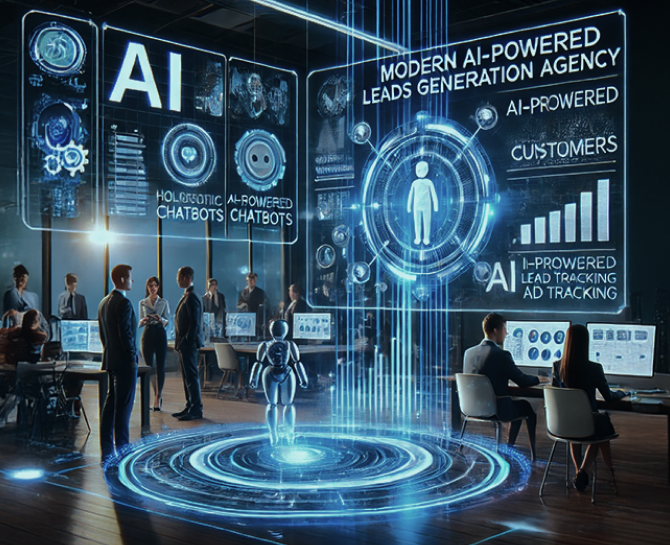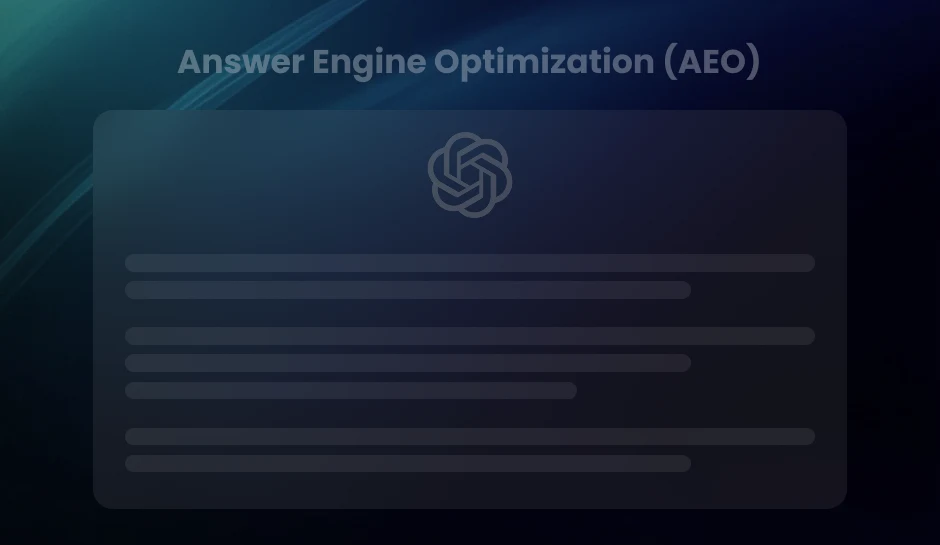
AI Lead Generation Agency: Transforming How Businesses Acquire Customers
Transform your customer acquisition process with AI-powered lead generation. Our agency uses advanced machine learning, data analytics, and automation to identify high-quality leads, personalize outreach, and enhance conversions. Say goodbye to outdated methods and embrace AI-driven precision for measurable growth.
AI lead generation agencies are redefining how businesses attract, engage, and convert potential customers. These agencies leverage machine learning, predictive analytics, and automation to identify high-quality leads with greater precision and efficiency. Unlike traditional methods that rely on manual prospecting and broad advertising, AI-driven solutions analyze extensive datasets to uncover patterns, optimize targeting, and personalize outreach at scale.
Companies working with AI-powered agencies experience faster lead qualification, higher conversion rates, and reduced customer acquisition costs. By automating repetitive tasks and enhancing decision-making with data-driven insights, AI enables businesses to focus on high-value interactions with prospects who are more likely to convert.
Traditional lead generation often involves cold calls, email blasts, and demographic-based targeting. AI systems, on the other hand, refine these approaches by predicting customer behavior, continuously learning from interaction data, and adjusting campaigns in real-time. This shift moves businesses away from guesswork and toward precision-driven strategies that yield measurable growth.
AI-Driven Lead Generation Strategies

- Predictive Lead Scoring: Machine learning models evaluate historical data and assign scores to prospects based on their likelihood to convert.
- AI-Powered Data Enrichment: Algorithms collect and analyze publicly available and proprietary data to build detailed prospect profiles.
- Automated Outreach Optimization: AI continuously refines messaging based on recipient engagement, ensuring higher response rates.
- Natural Language Processing (NLP) for Intent Analysis: AI scans and interprets online interactions to determine user intent, improving targeting precision.
- Dynamic Content Personalization: AI customizes messaging in real-time based on recipient behavior, increasing engagement.
Personalization: The AI Advantage in Marketing Campaigns
Personalizing Customer Interactions for Increased Engagement
AI-driven personalization transforms how businesses communicate with their audience. By analyzing vast datasets, AI detects patterns in customer behavior and tailors interactions accordingly. This data-driven approach increases engagement by delivering relevant content, offers, and recommendations at the right time.
Machine learning models process historical interactions to predict future customer preferences. With these insights, AI customizes website experiences, dynamically adjusting layouts, product recommendations, and messaging based on user activity. Chatbots, guided by AI, respond with personalized messages, creating a seamless and interactive user journey.
Real-time data processing enhances this strategy. AI tracks user engagement across multiple channels, updating personalization elements instantly. Customers interacting with email campaigns, social media ads, or websites receive consistent, hyper-relevant experiences across all touchpoints.
AI-Powered Customer Segmentation for Tailored Messaging
Traditional segmentation methods rely on broad demographic data, while AI-driven customer segmentation drills deeper. AI clusters individuals based on behavioral, psychographic, and contextual data, resulting in highly refined audience segments that receive more precise messaging.
Machine learning algorithms analyze purchase history, browsing behavior, and engagement levels to form micro-segments. AI identifies hidden correlations between attributes that manual analysis would overlook, making segmentation more accurate and actionable.
Once segmented, AI personalizes messages at scale. Marketing platforms use AI to create dynamic email campaigns, adjusting subject lines, images, and calls-to-action based on a recipient’s engagement patterns. In digital advertising, AI optimizes targeting by identifying the most relevant ad creatives for different customer groups, maximizing ad performance.
The Vital Role of Natural Language Processing for Content Creation
Natural Language Processing (NLP) enables AI to generate compelling, audience-specific content. By understanding context, sentiment, and intent, NLP-driven AI tools craft highly personalized messages that resonate with different customer segments.
Chatbots powered by NLP hold meaningful conversations, interpret customer inquiries, and generate responses that feel human-like. Brands leverage NLP for automated content generation, producing personalized blog articles, product descriptions, and social media posts that align with audience preferences.
AI-driven sentiment analysis enhances personalization by adjusting tone and messaging based on customer emotions. If a user expresses frustration, AI-generated responses adopt a supportive approach. When excitement is detected, promotional messages take a more enthusiastic tone. This adaptability strengthens customer relationships, fostering a sense of connection between brands and their audiences.
Pro Tip- Leverage AI-driven A/B testing to refine personalization strategies. By continuously analyzing user engagement and response patterns, AI can dynamically adjust the content, subject lines, and messaging tones to optimize customer interactions. This ensures that every touchpoint delivers the most relevant and impactful experience, boosting engagement and conversion rates.
Sales and Lead Conversion Boost through AI
Utilizing Machine Learning for Enhanced Sales Strategies
Machine learning transforms sales processes by analyzing large datasets and identifying patterns that drive conversions. Predictive analytics enables sales teams to focus on high-value leads, reducing wasted efforts. Algorithms evaluate customer behavior, purchasing habits, and engagement history to recommend the best outreach strategies.
Dynamic pricing models, powered by AI, adjust product prices based on market conditions, competitor pricing, and demand fluctuations. This approach maximizes revenue opportunities while maintaining competitiveness. AI-driven sentiment analysis deciphers customer emotions from emails, chat interactions, and calls, helping sales teams tailor their communication strategies for better engagement.
Conversion Rate Optimization Using AI: Techniques and Results
AI refines conversion strategies by testing variations of landing pages, call-to-action (CTA) buttons, and messaging to determine the most effective combinations. Multivariate testing, more advanced than traditional A/B testing, evaluates multiple variables simultaneously to accelerate the optimization process. Real-time recommendations ensure that website visitors see offers that are most aligned with their interests.
- Chatbot-assisted engagement: AI chatbots qualify leads by asking relevant questions, reducing the time sales reps spend on unqualified prospects.
- Lead scoring automation: AI assigns probability scores to each lead based on past interactions, purchasing behavior, and demographic data.
- Personalized follow-ups: AI generates behavior-based email sequences, ensuring follow-ups are timely and relevant, increasing response rates.
- Speech and text analysis: AI evaluates sales calls and emails to identify successful patterns, refining scripts and training approaches.
Companies implementing AI in conversion strategies see measurable improvements. According to a study by McKinsey, AI-driven sales processes can increase lead conversion rates by up to 50%. Another report by Harvard Business Review highlights that businesses using AI for lead management generate 20% more sales opportunities than those relying on traditional methods.
Pro Tip- Integrate AI-powered predictive analytics into your CRM to prioritize high-value leads effectively. By continuously analyzing engagement patterns and purchasing behaviors, AI can recommend the best timing and messaging for follow-ups, increasing the likelihood of conversion while minimizing wasted efforts.
Data-Driven Decision-Making for Business Growth
Leveraging Customer Data to Fuel Business Strategies
Data shapes strategic business decisions, transforming raw numbers into actionable insights. An AI lead generation agency collects and processes customer data to identify patterns, preferences, and behaviors. This enables businesses to refine marketing campaigns, optimize customer engagement, and maximize revenue.
Customer segmentation improves with AI-driven data analysis. Instead of broad demographic groupings, AI refines segments based on real-time behaviors, purchase history, and engagement trends. This precision enhances targeting efforts, reducing ad spend waste and improving conversion rates.
Predictive analytics takes decision-making further. AI models process historical data to forecast future customer actions, allowing businesses to proactively tailor offers and messaging. Companies using predictive analytics see a 21% increase in marketing ROI, according to a study from McKinsey & Company.
AI’s Role in Harvesting and Analyzing Large Data Sets
AI processes vast volumes of data faster and more accurately than traditional methods. Machine learning algorithms analyze structured and unstructured data from multiple sources-social media, email interactions, customer support tickets, and purchase histories-extracting meaningful patterns that drive business growth.
Natural language processing (NLP) enables AI to extract sentiment and intent from customer feedback, product reviews, and survey responses. This insight helps businesses adjust offerings, improve customer satisfaction, and respond quickly to market trends.
Real-time analytics facilitates immediate course correction. AI tools monitor campaign performance and customer interactions as they happen, flagging underperforming strategies and highlighting opportunities for optimization. Organizations leveraging AI-powered analytics report a 19% faster revenue growth rate, according to a report from MIT Sloan Management Review.
Ethical Considerations and Responsible Use of Customer Data
AI lead generation agencies handle sensitive customer data, making ethical data use essential. Compliance with regulations like GDPR and CCPA ensures user privacy and legal adherence. Businesses implementing AI-driven lead generation must maintain transparency in data collection, giving customers control over their personal information.
Bias in AI models poses another challenge. If trained on biased datasets, AI can reinforce existing inequalities in marketing campaigns. Continuous monitoring, diverse training data, and fairness audits help mitigate this risk, ensuring unbiased targeting.
Data security remains a priority. AI systems storing customer insights must incorporate encryption, access controls, and threat detection mechanisms to prevent breaches. The cost of a data breach reached an average of $4.45 million in 2023, according to IBM’s “Cost of a Data Breach Report,” reinforcing the need for stringent security protocols.
Ethical AI practices strengthen customer trust, fostering loyalty and long-term retention. Businesses that prioritize responsible data use see improved brand reputation and higher engagement rates.
Pro Tip- By implementing regular audits, ensure your AI-driven data strategies align with ethical guidelines and privacy regulations. Transparent data collection practices and clear opt-in options help build customer trust while maintaining compliance with GDPR, CCPA, and other legal frameworks.
AI-Powered Tools and Tactics for Conversion Rate Optimization
Exploring Tools for Optimizing Web Pages to Improve Conversion
AI-powered platforms refine web page elements to increase conversion rates by analyzing user behavior and predicting optimal adjustments. Tools such as Unbounce and Optimizely employ machine learning to test multiple variations of a landing page, ensuring that visitors encounter the most effective design, content, and call-to-action.
Some AI-driven features that enhance conversion optimization:
- Dynamic Content Adaptation: AI personalizes on-page content based on visitor attributes, such as location, browsing history, or past interactions.
- Behavioral Triggers: Platforms like Hotjar and Crazy Egg track user movements and trigger actions like exit-intent pop-ups when engagement drops.
- AI-Based Chatbots: Tools like Drift and LivePerson provide real-time responses, capturing leads before they leave.
Real-Time Adjustments and A/B Testing with AI Assistance
Traditional A/B testing requires time to gather statistically sound results, but AI accelerates this process by analyzing vast datasets instantly. Tools like Google Optimize and Adobe Target dynamically adjust web elements in real-time, ensuring that pages continuously evolve based on user engagement.
AI-driven real-time testing includes:
- Predictive Testing: AI forecasts which variations will perform best before a test concludes, allowing early implementation.
- Automated User Segmentation: Machine learning categorizes visitors into micro-segments and presents optimized content for each group.
- Autonomous Experimentation: AI identifies underperforming elements and replaces them without manual intervention.
Measuring and Enhancing ROI Through AI Technologies
Maximizing return on investment requires precise measurement of campaign performance and conversion drivers. AI analytics platforms such as Tableau and Google Analytics 4 provide deep insights by integrating real-time data across multiple channels.
Key AI-driven enhancements for ROI measurement:
- Attribution Modeling: AI determines which touchpoints contribute most to conversions, guiding budget allocation.
- Automated Engagement Scoring: AI ranks leads based on the likelihood to convert, ensuring that sales teams focus on high-potential prospects.
- Predictive Revenue Forecasting: Machine learning predicts future revenue trends by analyzing past customer behaviors and current market conditions.
Companies leveraging AI for conversion rate optimization gain a competitive edge by making data-driven, automated adjustments that continuously refine user experiences and maximize conversions.
Pro Tip- Leverage AI-driven heatmaps and session recordings to uncover hidden friction points in the user journey. Tools like Hotjar and Microsoft Clarity provide visual insights into user interactions, allowing you to make data-backed optimizations that enhance engagement and drive higher conversions..
Measuring the Impact of AI on ROI
Analyzing ROI Improvement Through AI Technologies
AI-powered lead generation enhances efficiency and reduces costs, leading to measurable improvements in return on investment (ROI). Businesses using automated lead-scoring models experience increased sales productivity and higher conversion rates. For example, companies implementing predictive analytics for lead qualification have reported a 20% increase in sales opportunities (Forrester, 2023).
Machine learning algorithms refine targeting by analyzing large datasets, resulting in more relevant lead identification. A study by McKinsey found that firms leveraging AI for customer acquisition reduced customer acquisition costs by up to 50% while improving ROI by 15-20%.
Quantifying the Benefits of AI in Lead Generation and Sales
- Lead Conversion Rates: AI-driven lead nurturing increases conversion rates by analyzing prospect behavior and optimizing follow-up strategies. According to HubSpot, companies using AI-driven chatbots for lead nurturing see an average increase of 30% in conversions.
- Sales Cycle Acceleration: AI speeds up lead qualification, reducing the time required for sales teams to close deals.
- Cost per Lead Reduction: AI-driven automation cuts manual efforts and ad spend waste, lowering customer acquisition costs. Companies adopting AI-based programmatic advertising report a 25% reduction in ad spend inefficiencies.
- Customer Retention Rates: AI-powered personalization enhances engagement, leading to stronger customer retention. Businesses employing AI-driven CRM systems experience a 10-15% improvement in retention rates.
The Long-Term Value Proposition of Investing in AI for Lead Generation
Short-term gains in efficiency and conversion are clear, but the long-term value of AI integration in lead generation extends far beyond initial profit increases. Companies fully integrating AI into their sales processes report sustained revenue growth and market dominance.
Over a five-year period, businesses that leverage AI for lead generation see a compounding effect. Predictive analytics continuously refine targeting, improving lead quality over time. AI-powered customer insights help tailor evolving marketing strategies, reducing churn and boosting lifetime customer value. A report by Deloitte highlights that AI-augmented firms are 33% more likely to be industry leaders in revenue and profitability.
Investments in AI lead generation transform business operations, not just sales figures. AI-driven decision-making enhances agility, giving companies a competitive edge in fast-evolving markets. In an economy where data defines success, AI ensures that businesses stay ahead, optimizing performance while maximizing ROI.
The Evolution of Customer Interactions with AI Chatbots and Virtual Assistants
Enhancing Lead Nurturing and Customer Service through AI Chatbots
AI chatbots handle customer interactions with speed and efficiency. They qualify leads, answer common inquiries, and guide prospects through the sales funnel. With natural language processing (NLP) advancements, chatbots analyze customer intent rather than relying on predefined scripts. This allows for adaptive conversations that improve engagement.
In lead nurturing, AI chatbots automate follow-ups. They send reminders, offer personalized recommendations, and provide relevant content based on user behavior. Businesses that integrate chatbots into their sales processes report shortened response times and increased conversion rates.
Customer service benefits from AI chatbots as well. Around-the-clock availability ensures immediate responses. Sentiment analysis helps detect frustration, allowing the system to escalate issues to human agents when necessary. The result: faster resolutions and higher customer satisfaction.
The Human Touch in AI Interactions: Finding the Balance
While AI chatbots and virtual assistants streamline interactions, businesses must balance automation with human oversight. AI manages routine tasks, but complex inquiries still require human intervention. A study by PwC found that 59% of consumers feel companies have lost the human element in digital customer experiences. Ensuring seamless handoffs to human representatives preserves customer trust.
Hybrid AI-human models combine efficiency with personalization. Chatbots handle initial interactions, while human agents take over high-value conversations. This approach maximizes lead nurturing and enhances the customer experience.
Pro Tip- Use AI chatbots to gather key customer data during interactions and pass it seamlessly to human agents. By integrating CRM systems with chatbots, businesses ensure that agents have full conversation history and context, leading to more personalized and effective customer service.
AI-Powered Lead Generation: A Strategic Advantage
The Critical Role of AI in Modern Lead Generation
Artificial intelligence has redefined how businesses approach lead generation. AI-powered solutions analyze vast datasets, automate tedious tasks, and refine targeting precision. With predictive analytics, intent-based scoring, and real-time engagement tracking, companies generate higher-quality leads while reducing manual effort.
AI Lead Generation Agencies: A Strategic Partner for Growth
Businesses integrating AI-driven agencies into their marketing and sales strategies gain a competitive edge. These agencies deploy machine learning models, chatbot automation, and personalized outreach techniques to increase conversion rates. With AI, campaigns scale efficiently, and decision-making becomes data-driven rather than instinct-based.
Key Takeaways
- AI-powered lead generation agencies leverage machine learning, predictive analytics, and automation to enhance targeting, improve lead quality, and optimize conversion rates. Unlike traditional methods, AI eliminates guesswork by analyzing vast datasets for precise audience engagement.
- AI enables hyper-personalized marketing by dynamically adjusting content, messaging, and customer interactions based on real-time behavioral insights. Businesses using AI-driven personalization see improved engagement, stronger customer relationships, and higher retention rates.
- AI-powered tools optimize lead scoring, automate outreach, and refine conversion strategies through real-time testing and predictive analytics. Companies leveraging AI in sales experience faster deal closures reduced acquisition costs, and improved revenue growth.
- While AI accelerates lead generation and sales, ethical considerations such as data privacy, bias mitigation, and security must be prioritized. Businesses that implement AI responsibly build customer trust, ensuring sustainable long-term success.
Adopting AI-powered lead generation no longer remains an option but a necessity for businesses seeking sustained growth.
Partnering with a specialized AI lead generation agency unlocks data-driven insights, automates engagement, and improves lead quality. Drop us a line at info@diggrowth.com to optimize your sales pipeline, explore AI-driven solutions, and embrace a future where efficiency meets intelligence.
Ready to get started?
Increase your marketing ROI by 30% with custom dashboards & reports that present a clear picture of marketing effectiveness
Start Free Trial
Experience Premium Marketing Analytics At Budget-Friendly Pricing.

Learn how you can accurately measure return on marketing investment.
Additional Resources
Don’t Let AI Break Your Brand: What Every CMO Should Know
AI isn’t just another marketing tool. It’s changing...
Read full post postFrom Demos to Deployment: Why MCP Is the Foundation of Agentic AI
A quiet revolution is unfolding in AI. And...
Read full post postAnswer Engine Optimization (AEO): The New Frontier of SEO in 2025
As digital experiences continue to evolve, so does...
Read full post postFAQ's
An AI lead generation agency uses artificial intelligence, machine learning, and automation to identify, engage, and convert potential customers. By analyzing vast amounts of data, these agencies optimize targeting, personalize outreach, and enhance lead qualification processes, resulting in higher conversion rates and lower acquisition costs.
Unlike traditional lead generation methods that rely on manual prospecting and broad-based marketing, AI-driven solutions analyze behavioral patterns, intent signals, and historical data to identify high-quality leads. AI continuously learns and refines its approach, ensuring that businesses engage with prospects who are most likely to convert.
AI lead generation agencies implement strategies such as predictive lead scoring, AI-powered data enrichment, automated outreach optimization, natural language processing (NLP) for intent analysis, and dynamic content personalization. These strategies ensure efficient lead nurturing and higher engagement rates.
No, AI enhances sales and marketing efforts rather than replacing human teams. AI automates repetitive tasks, analyzes large datasets, and provides insights to optimize decision-making. However, human expertise remains crucial for building relationships, handling complex negotiations, and providing a personalized touch in customer interactions.
Businesses partnering with AI lead generation agencies experience faster lead qualification, higher conversion rates, reduced customer acquisition costs, and improved marketing efficiency. AI also helps businesses scale outreach efforts, optimize campaigns in real-time, and make data-driven decisions to maximize ROI.
 Richa Bhardwaj
Richa Bhardwaj  Rahul Sachdeva
Rahul Sachdeva 

